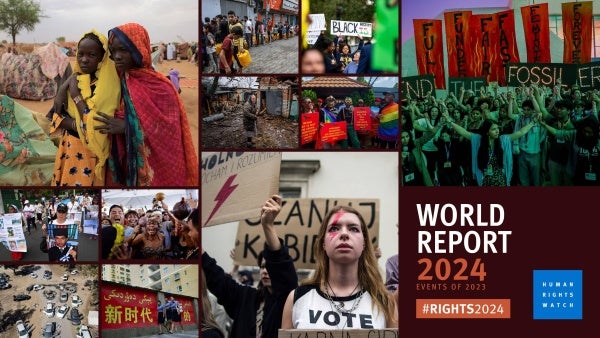Hier die deutsche Ausgabe lesen / Lire la version en français
Human Rights Watch’s World Report is being published today. It’s our annual look at the conditions in some 100 countries around the globe and an overall assessment of where humanity stands in terms of our fundamental freedoms and rights.
If you’re interested in any one particular country, I encourage you to go to the home page of the World Report, select that location, and dig deeper. In the new publication’s hundreds of pages, you’ll find rich material, packed with detail.
Here, however, I’d like to focus on the “big picture.” On Monday, I discussed in this newsletter, how doing this kind of thing – that is, seeking to describe global trends in a world of country-by-country particularities – is extremely difficult. Today, I want to explain why it’s also essential: in short, it’s because humanity needs to learn lessons and do better.
In our World Report, the big picture on human rights globally is described in a long, thoughtful essay by our executive director, Tirana Hassan. Of course, I hope you will read the whole thing, but let me highlight the core point here:
Global leaders are failing at the foundations.
Both the causes and consequences of all humanity’s major problems today – from the atrocities seen in numerous conflicts, to the climate crisis, to extreme economic inequality – ignore national borders and cannot be solved by governments acting alone.
Following the last truly global human catastrophe, WW2, world leaders realized they had to work together going forward. To do so, they created institutions like the United Nations. More importantly, they agreed on shared universal principles, upon which international cooperation should be based.
Promoting international human rights and the rule of law, they knew, would help address global problems. At the core of this multi-national, multi-cultural, and multi-faith effort 75 years ago was the Universal Declaration of Human Rights, the basis of all contemporary human rights conventions and treaties.
This unifying achievement of shared principles is the foundation of our modern world – yet global leaders today are too often ignoring it.
They don’t ignore it all the time, of course. Political leaders will often refer to the declaration or the shared sense of morality that stems from it. But far too often these days, they only do so when it suits their particular geopolitical aims.
Instead of sticking to principles consistently, global leaders give us situational ethics and double standards. Tirana lists numerous cases in her essay and in her opening comments at the World Report launch event:
For example, many of the governments that condemned Hamas’ war crimes have been muted in responding to those by the Israeli government.
Some governments around the world are vocal in condemning Israeli government war crimes against civilians in Gaza but silent about Chinese government crimes against humanity in Xinjiang.
Others demand international prosecution for Russian war crimes in Ukraine while undermining accountability for past US abuses in Afghanistan.
I’ve said it again and again: if you only care about human rights abuses and atrocities when your enemies commit them, then you don’t really care about human rights abuses and atrocities. You’re responding to horror with politics, not principles.
And it’s not simply a moral shame that leaders don’t uphold our core values consistently. It weakens the general belief in the universality of human rights and undermines trust in the legitimacy of the laws designed to protect them. This has devastating, even deadly, consequences.
As Tirana writes: “When governments pick and choose which obligations to enforce, they perpetuate injustice not only in the present but in the future for those whose rights have been sacrificed – and can embolden abusive governments to extend the reach of their repression.”
Too many world leaders today can (and do) essentially say, “why should my friends and I follow the rules, when you and your friends are not following the rules?” This attitude establishes and maintains so many of the horrors we are witnessing now. It also prepares space for even greater disasters to come.
With our leaders increasingly abandoning our universal principles, we all understand the lessons from history they are rejecting.
The people who came before us knew that the people who came before them had wrecked the world with their parochial passions and narrow nationalisms. They started to put in place international institutions and agreed rulebooks that would help humanity avoid making the same mistakes. Today, we are ignoring them at our peril, and countless people are paying a horrific price.
If we want a better world, if we want to avoid the horrors of the past, we must expect and demand our leaders reverse the trend toward part-time principles.




